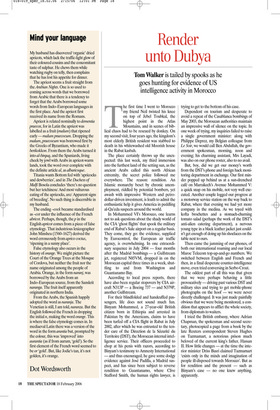Mind your language
My husband has discovered ‘organic’ dried apricots, which lack the traffic-light glow of their coloured cousins and the concomitant taste of sulphur. He chews them while watching rugby on telly, then complains that he has lost his appetite for dinner.
The apricot seems a fruit straight from the Arabian Nights. One is so used to coming across words that we borrowed from Arabic that there is a tendency to forget that the Arabs borrowed some words from Indo–European languages in the first place. And the apricot first received its name from the Romans.
Apricot is related nominally to dementia praecox, for in Latin the apricot was labelled as a fruit (malum) that ripened early — malum praecocum. Dropping the malum, praecocum was borrowed first by the Greeks of Byzantium, who made it berikokkon. From them the Arabs turned it into al-birquq, and the Spaniards, living cheek by jowl with Arabs in apricot-warm lands, took the word over complete with the definite article al, as albaricoque.
Titania wants Bottom fed with ‘apricocks and dewberries’, and in The Duchess of Malfi Bosola concludes ‘there’s no question but her tetchiness/ And most vulturous eating of the apricocks, are/ Apparent signs of breeding’. No such thing is discernible in my husband.
The ending –cock became standardised as –cot under the influence of the French abricot. Perhaps, though, the p in the English apricot comes from a piece of false etymology. That industrious lexicographer John Minsheu (1560–1627) derived the word erroneously from aprico coctus, ‘ripening in a sunny place’.
False etymology also occurs in the history of orange. We might picture the Court of the Orange Trees at the Mosque of Cordova, but neither the fruit nor the name originated among the people of Arabia. Orange, in the form naranj, was borrowed by the Arabs from an Indo–European source, from the Sanskrit naranga. The fruit itself apparently originated in northern India.
From the Arabs, the Spanish happily adopted the word as naranja. The Venetian is still, I am told, naranza. But the English followed the French in dropping the initial n, making the word orange. This is where the false etymology comes in. In mediaeval Latin there was a version of the word in the form arantia but, prompted by the colour, this was ‘improved’ into aurantia (as if from aurum, ‘gold’). So the first element of the French word seemed to be or ‘gold’. But, like Jodie’s tan, it’s not golden, it’s orange.


















































































 Previous page
Previous page